Achievements in the field of research and innovation during 2020-2023
- 437 views
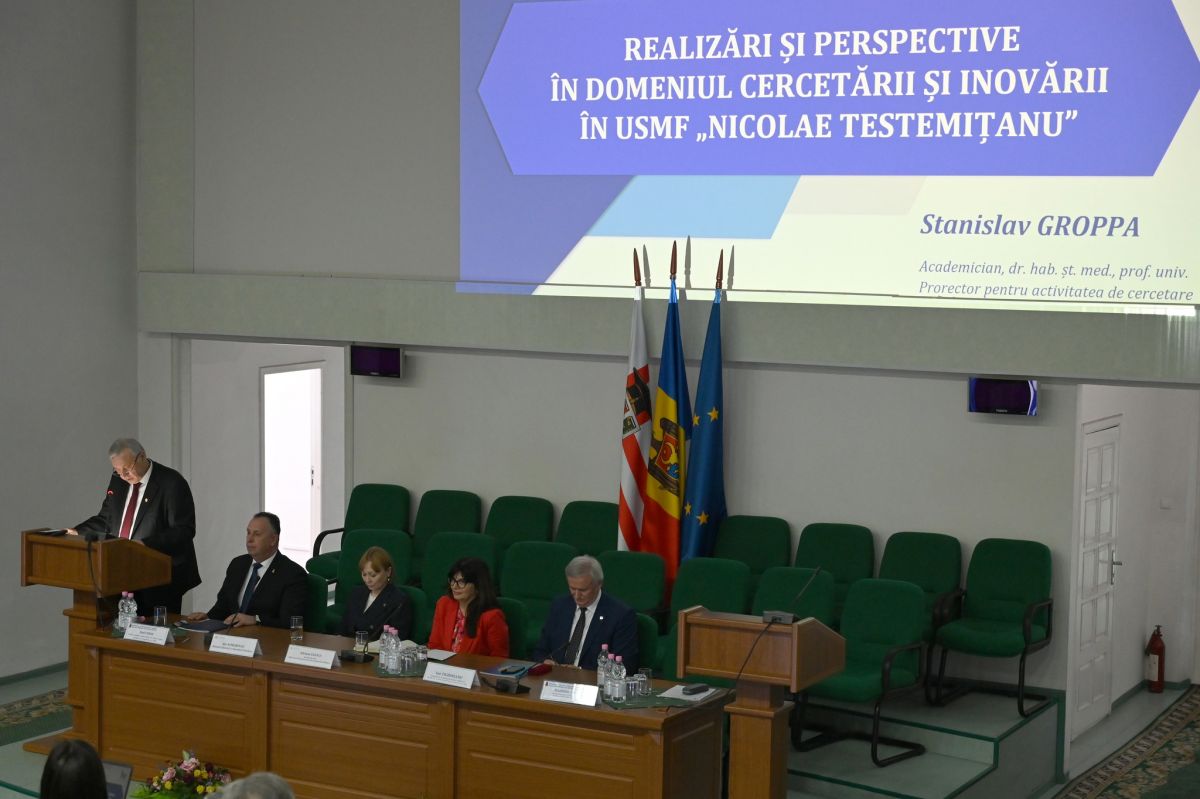
The field of research and innovation at Nicolae Testemitanu State University of Medicine and Pharmacy achieved a higher level of performance and competitiveness during 2020-2023, offering opportunities for sustainable institutional development. Academician Stanislav Groppa, vice-rector for research, announced this at the meeting of the University Senate on February 22, 2024.
Special attention was directed to the organization, modernization and endowment of research structures with modern equipment and technologies. For this purpose, the Health and Biomedical Research Center (HBRC) was created – as part of the National Institute for Health and Medical Research (NIHMR), which coordinated the implementation of 27 projects under the State Program, as well as other international projects, technology transfer projects, etc.
Until now, the reconstruction project of the former Central Scientific Laboratory building, where the HBRC will be organized, has been developed, with international expertise and a feasibility study being carried out. The project provides for the reconstruction and expansion of the building with a new clinical and experimental space – with laboratories and clinical offices, equipped with modern technologies. At the same time, it was decided to restructure the Health and Biomedical Research Center, by creating 5 research centers: Molecular Medicine Center, Personalized Medicine Center, Drug Development Center, Abdominal Pathology and Transplantation Center and Center for Brain Health.
This research subdivision is to host the Regional Center of the International Center for Genetic Engineering and Biotechnology (ICGEB), where researchers from the University, but also from other institutions, will have the opportunity to collaborate with their international counterparts. "This concept is essential not only in the process of internationalization of research, but also for concrete extrapolation in the adjustment of curricula to international standards and integration in the European research space," Professor Groppa noted.
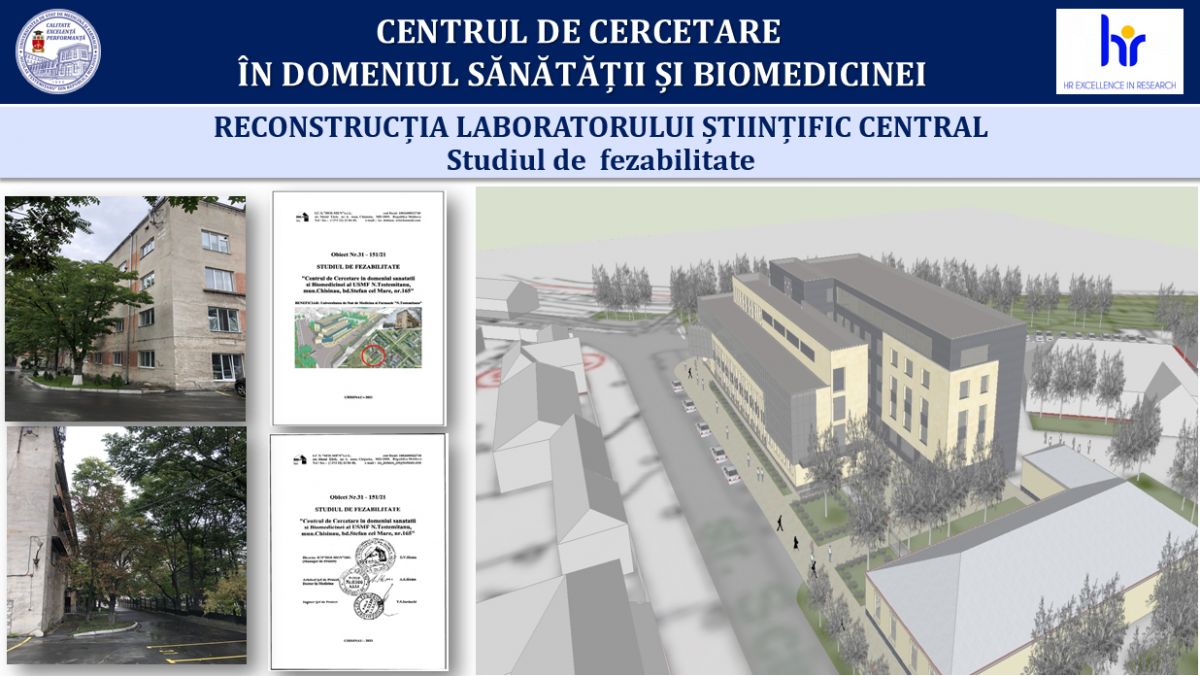 The core of the Health and Biomedical Research Center will be made up of several fundamental structures: the Center for Molecular Medicine, the Center for Personalized Medicine, the Biobank, the Center for Biotechnologies in Pharmacy and Medicine, the Microbiology and Virology Laboratory, the Bioinformatics and Computational Medicine Laboratory and centers of fundamental clinical activity. The centers of molecular medicine and personalized medicine will include the laboratories of: Morphology, Confocal Microscopy, Molecular Biology, Biochemistry, Cell Cultures, Immunology, Genetics, Genomics and Bioinformatics. The respective structures will be created under "Moldova Higher Education" project implemented by the Ministry of Education and Research of the Republic of Moldova in the period 2020-2025 and are parts of the sub-projects FORCE_Med and FORCE_Farm, in a total amount of 4.150 million euros, which are intended for the enhancement of education through research in medicine and pharmacy.
The core of the Health and Biomedical Research Center will be made up of several fundamental structures: the Center for Molecular Medicine, the Center for Personalized Medicine, the Biobank, the Center for Biotechnologies in Pharmacy and Medicine, the Microbiology and Virology Laboratory, the Bioinformatics and Computational Medicine Laboratory and centers of fundamental clinical activity. The centers of molecular medicine and personalized medicine will include the laboratories of: Morphology, Confocal Microscopy, Molecular Biology, Biochemistry, Cell Cultures, Immunology, Genetics, Genomics and Bioinformatics. The respective structures will be created under "Moldova Higher Education" project implemented by the Ministry of Education and Research of the Republic of Moldova in the period 2020-2025 and are parts of the sub-projects FORCE_Med and FORCE_Farm, in a total amount of 4.150 million euros, which are intended for the enhancement of education through research in medicine and pharmacy.
"The implementation of these sub-projects will contribute to significantly increasing the training capacity and the quality of medical education through research, to the training of highly qualified doctors and pharmacists for the health system. At the same time, it will be possible to connect the skills of graduates in the field of Health to the current requirements of the labor market", academician Stanislav Groppa specified.
Regarding the foundation of the Biobank, the Law on the Biobank was voted in the first reading and the software of the Register of informational records of bio-specimens was created. Accordingly, at the end of 2022, Nicolae Testemitanu University became a member of the European Society for Biobanks and Biopreservation (ESBB). Also, the experimental base for research was developed - the Vivarium, with the purchase of genetically pure laboratory animals of the Wistar line, as part of a cross-border project, and the authorization to operate the Vivarium was obtained.
At the same time, 4 research laboratories resumed their activity: Cardiology, ENT, Mental Health, Management and Psychology.
In the period 2020-2023, the scientific community actively participated in the competitions launched for national and international projects, which essentially increased the visibility of the institution. Nicolae Testemitanu University participated in 3 European Horizon 2020 projects, a fact that allowed integration into the international network and the opening of new opportunities for cooperation with some European consortia made up of over 40 countries. The European COST program created possibilities for the involvement of teams in 12 COST actions and for benefiting from academic mobility, participation in training activities and conferences, the development of collaborations and the preparation of proposals under Horizon program.
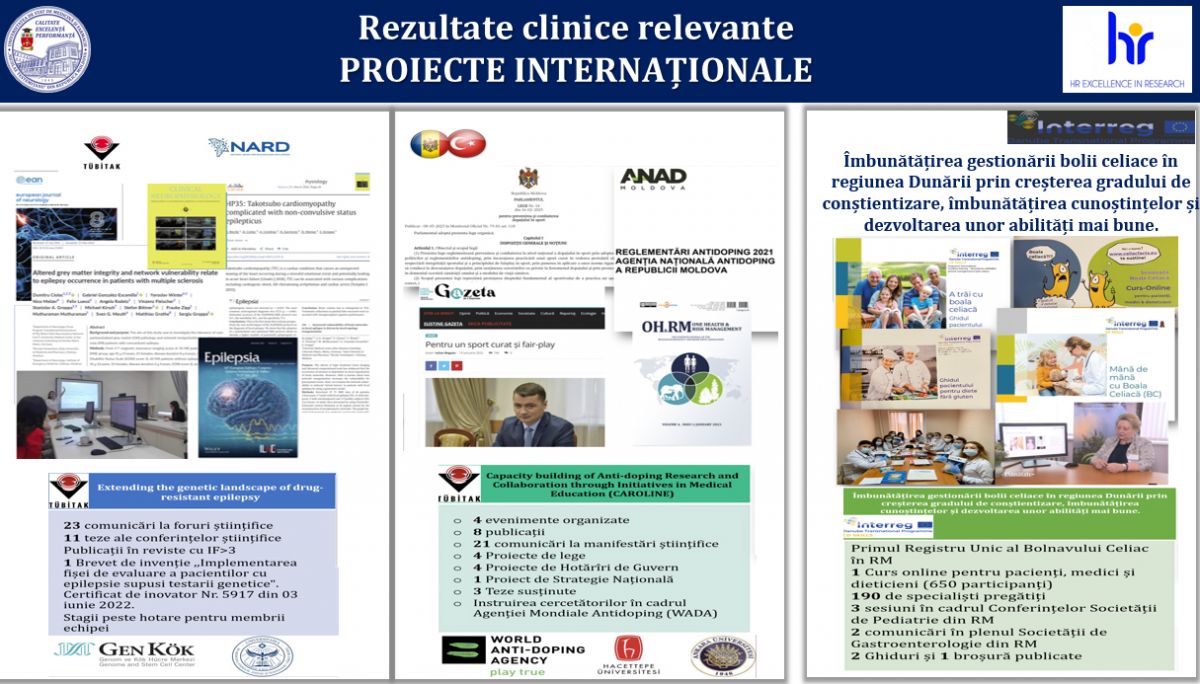
The University's participation in multilateral projects is relevant: EraNet.Plus and "Phage treatment and wetland technology as intervention strategy to prevent dissemination of antibiotic resistance in surface waters (“PhageLand”). The Republic of Moldova became a member of the Antimicrobial Resistance Program. In this context, Nicolae Testemitanu University jointly with institutions from 6 partner countries have developed specific methods for the removal of multiresistant pathogens by creating specific bacteriophages. The procedures will be implemented in water treatment at sewage treatment plants. At the moment, the dynamic mapping of the consumption of antimicrobials in the country was successful.
3 bilateral projects were also successfully implemented based on the Scientific and Technological Cooperation Protocol between the National Agency for Research and Development (ANCD) and the Technological Research Council of Turkey (TUBITAK). As a result, new data were obtained about the genetics of epilepsy and the peculiarities of genetic polymorphism in the population of the Republic of Moldova and Turkey, as well as new data related to doping, diagnosis and prevention.
Also, a transnational and multidisciplinary regional network of medical services, research and training was created under the "Integrated cross-border network for advanced health services in the field of obesity, diabetes and other metabolic disorders - OBDIA-NET" project, implemented in partnership with Grigore T. Popa University of Medicine and Pharmacy from Iasi, Romania, and financed by the European Union through the Ministry of Regional Development, Public Administration and European Funds of the Government of Romania.
5 projects were carried out within the National Program for young researchers and 2 other projects in order to increase the research capacity of the Republic of Moldova in the fight against COVID-19, during the pandemic period.
Together with 18 partner institutions from nine countries of the Danube basin, the project "Improving the management of celiac disease in the Danube region by raising awareness, improving knowledge and developing better skills - CD SKILLS", was implemented through the Danube Transnational Program 2014-2020 . As a result, the unique Register of patients with celiac disease was created in the Republic of Moldova.
The NIHMR monitored the implementation of 114 research projects, of which 66 at the national level and 48 at the international level. In the opinion of vice-rector Groppa, the economic-financial evaluation of the dynamics of research projects for the period 2020-2023 demonstrates a fourfold budget increase (from 26.7 million lei to 109.1 million lei) and a 2,3 fold increase in the number of projects (from 51 to 114 projects). "We note the substantial amplification of the application process for projects both within national and international calls. Thus, there is an increase in the number of applications (from 5 projects in 2020 to 63 projects in 2023). This indicator ensures the sustainability of education through research at Nicolae Testemitanu University, “ the academician emphasized.
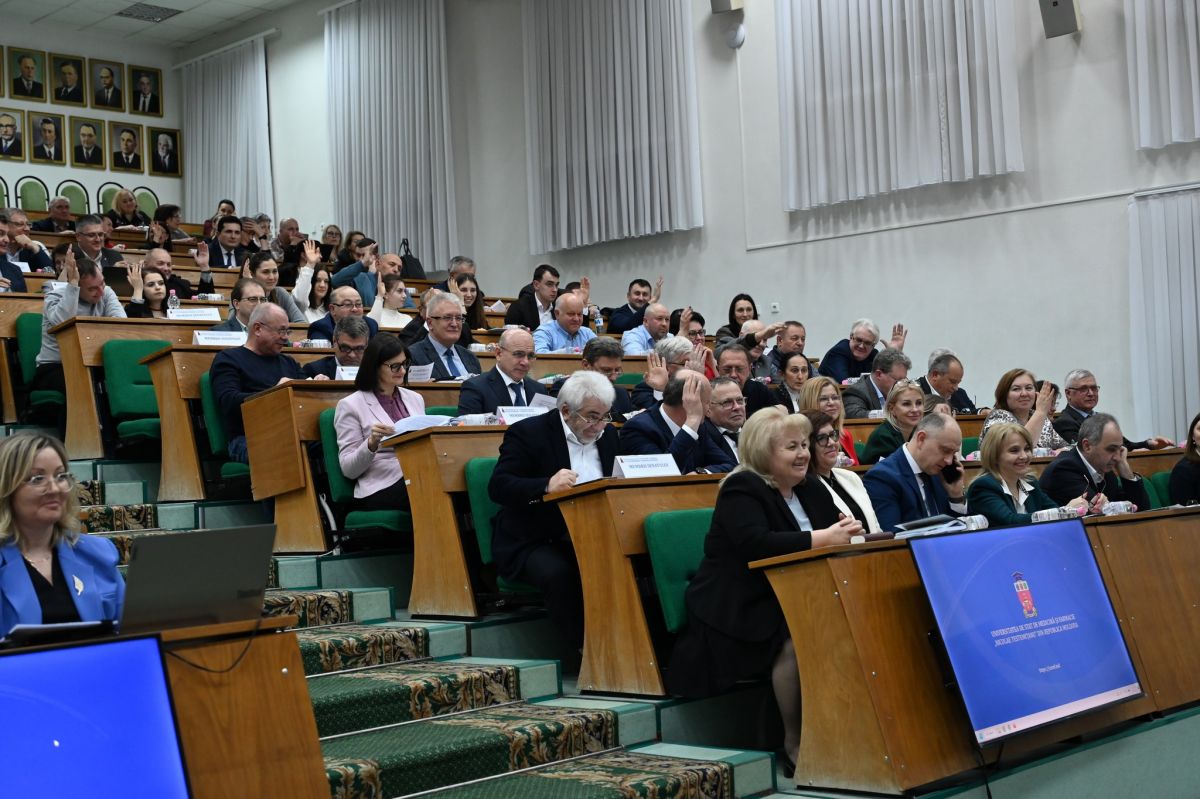
For the first time, the methodology for evaluating the economic impact of research results was applied, which was approved during the Senate meeting in February 2023. Thus, the final research results from all implemented projects were subjected to economic self-evaluation, in accordance with 5 performance indicators: relevance, effectiveness, efficiency, impact and sustainability. Competitive scientific results have been capitalized, according to requirements, in clinical, industrial, social and economic life through 150 intellectual property objects and 80 invention patents. Also, the dissemination of the results of research projects was achieved by organizing 70 events and publishing about 800 scientific articles in national and international journals, including those with an impact factor.
In the field of tissue engineering and cell cultures, the development of materials for transplantation in various bone and cartilage defects and in ophthalmology was achieved, procedures were developed to decellularized blood vessels and extract collagen from the umbilical-placental complex, and the adhesion of medicinal substances on surface of nanoparticles was demonstrated.
Relevant clinical results have been obtained in the field of neurobiology and medical genetics, which reflect the peculiarities in epileptogenesis from the diagnostic point of view and as regards the optimization of therapeutic management. The interneuronal mechanisms involved in triggering epileptic seizures were elucidated, the remodeling elements of multilayered, convolutional and recurrent neural networks were studied; the dynamic models of adaptation of cerebral connectivity at the cortico-subcortical level were appreciated; the mechanisms of epileptogenesis in immune-mediated pathologies, such as multiple sclerosis, viral (SARS-COV-2), parasitic (neurocysticercosis), were elucidated; the implementation of neuromodulation therapy of epileptogenic networks was carried out.
In the field of drug development, the following was achieved: the development and preclinical testing of medicinal plant substances and extracts with curative effects in dentistry, ENT and hepatology. The obtained pharmaceutical forms have reached the pilot production phase. Moreover, the analytical-normative and preclinical documentation was developed.
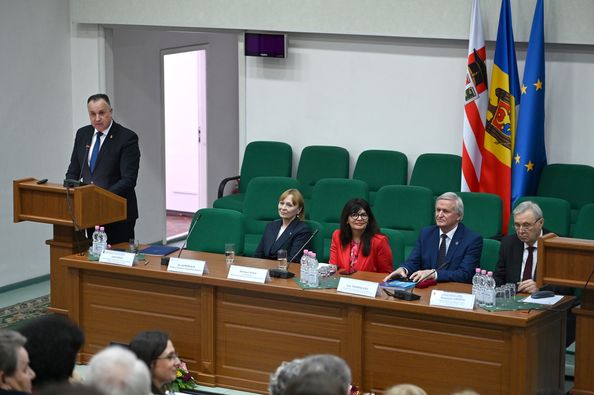
The scientific results recorded in the field of dentistry have contributed to the development of new surgical techniques in the treatment of various dental pathologies, the multidisciplinary investigation of functional pathologies of the stomatognathic system, the performance of regenerative medicine studies (stem cells, growth factors) in dentistry.
In the field of pediatrics, new diagnostic methods of children with primary glomerulonephritis have been implemented; respiratory support in premature newborns was optimized; cardiovascular damage in juvenile idiopathic arthritis was investigated; the early diagnosis and the impact on the quality of life of obese and overweight children were adjusted.
In the field of pediatric surgery, new schemes for the epidemiological assessment of congenital anomalies and acquired diseases in children were developed, the techniques for diagnosis, treatment, prophylaxis and reduction of complications, early and remote disabilities of the future adult were optimized, and new techniques of surgical treatment were developed.
Research in the field of morphology focused on addressing the health problems of pregnant women. The priority directions of research aimed at the evaluation of pathological forms of the placenta with an unfavorable impact on the pregnancy evolution.
In the field of urology and andrology, new data on spermatogenesis were recorded, methods of microsurgical interventions in azoospermia were implemented; the National Registry of Male Infertility software was developed; the Law on Reproductive Health was updated; on the international level, the collaboration with the European Academy of Andrology was initiated, including by participating in two joint projects.
In the field of reconstructive surgery of the digestive tract, a diagnostic-curative approach algorithm was developed for the liver in the liver cirrhosis condition, which allows the selection of patients in the terminal stage for liver transplantation from a living donor and a brain-dead donor.
In the field of hepato-pancreato-biliary surgery, research has focused on surgical pathology and trauma in pregnant women. The importance of minimally invasive and endoscopic treatment in pregnant patients with acute surgical pathology has been demonstrated.
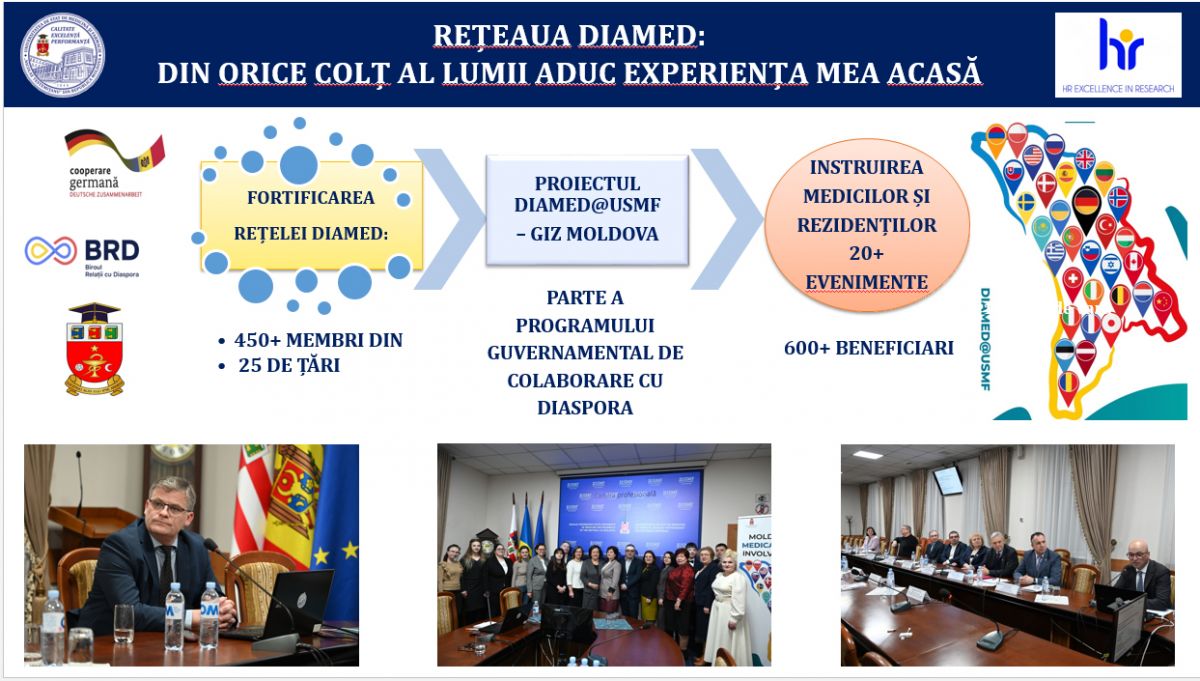
During the reference period, the number of doctoral students constantly increased: from 366 in 2020 to 404 in 2023 and of doctoral supervisors from 260 to 277. Currently, in the Consortium of the Doctoral School in Health Sciences there are 277 doctoral supervisors, 404 doctoral students, 7 postdoctoral students and 7 master's students. Out of 404 doctoral projects, 128 are carried out under co-supervision: 81 – through national co-supervision, 47 – through international co-supervision. In 2023, 75 doctoral students were enrolled in doctoral studies and 33 scientific and didactic staff members qualified as doctoral supervisors. The number of doctoral theses and habilitated doctoral theses increased from 20 (in 2020) to 50 in 2023. Research results were reflected in 32 monographs, 75 ISI-quoted articles, 277 articles published in peer-reviewed international journals and 498 articles – in peer-reviewed national journals. In the period 2020-2024, 19 doctoral and postdoctoral theses in medical sciences were defended, conducted in international co-supervision with representatives from 8 countries.
In the context of the research internationalization process, an integrative project was launched to establish a multilateral network aimed at:
- Collaboration with international research societies, such as: Association of Leibniz Institutes from Germany, Moldova Leipzig Institute, ICGEB‚ Merieux Foundation from France;
- Collaboration with universities and academic centers such as: University of Trieste, Italy, University of Ljubljana, Slovenia, Center for Research and Biomedical Studies in Riga, Latvia, University of Kaunas, Lithuania, Medical Research Center in Mainz, Germany, Laboratory of Bioinformatics from the USA;
- Collaboration with international structures that support research performance and offer research grants, such as: the DAAD International Office from Germany, the Agency for Development and Internationalization from Austria, the French Research Society, the Ministry of Research, Innovation and Digitization of Romania, etc.
- Collaboration with diplomatic missions in the Republic of Moldova: Embassies of Germany, USA, Italy, Latvia, Lithuania, Romania, China, etc.;
- The creation of the DiaMed medical diaspora network, represented by graduates of Nicolae Testemitanu University and the organization of various forms of collaboration, a project implemented in partnership with the Office of Diaspora Relations within the Government of the Republic of Moldova and the German Agency for International Cooperation (GIZ Moldova).
The reference period was also marked by the signing of collaboration agreements with several international institutions and research centers, which facilitated the expansion and sustainable development of priority research areas at the University.
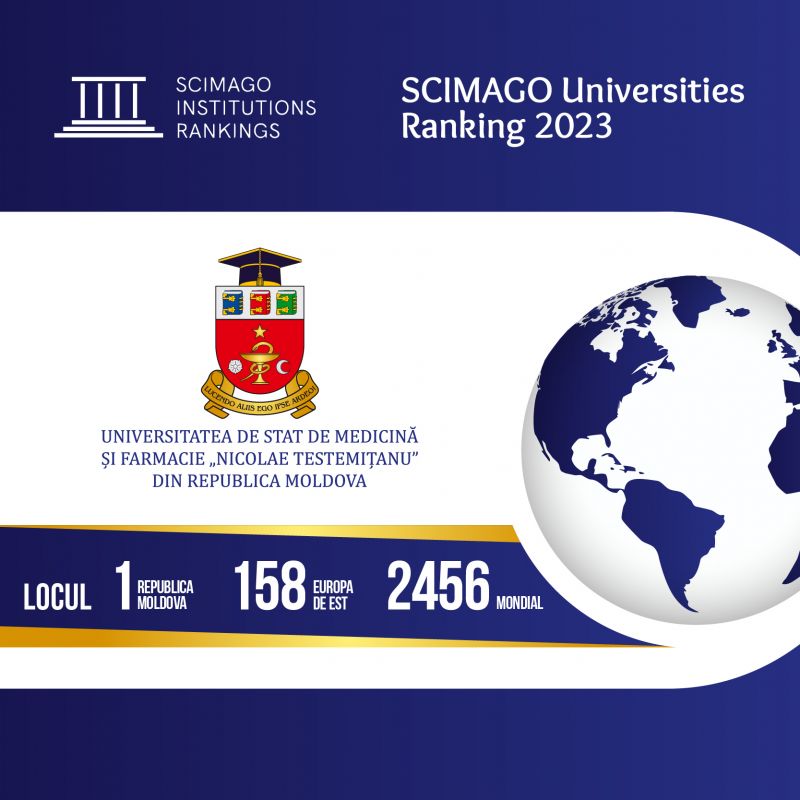
In terms of scientific visibility, for the 2nd year in a row, Nicolae Testemitanu University maintains its first place among the country’s universities and the 3657th position globally in the Ranking Web of Universities (Webometrics), advancing by 3496 positions at global level, compared to data from January 2020. The University has an increasingly strong presence in the international scientific community, demonstrated by significant contributions to the specialized literature, registered in the SCOPUS, Web of Science and Dimensions databases. In addition to quantitative growth, the quality of our research has also been recognized, as reflected by the evolution of the Hirsch index in SCOPUS from 32 (in 2020) to 52 (in 2023). This indicator measures both the productivity and citation impact of an author's or institution's work, and is a barometer of academic influence.
In April 2022, Nicolae Testemitanu University was included, for the first time, in the SCImago Institutions Rankings, which evaluate higher education institutions and research centers based on scientific performance and the impact of published works. “This recognition comes as a validation of the University's ongoing commitment to excellence in research and innovation. Being the only higher education institution from the Republic of Moldova present in this ranking not only increases the reputation of the University on a global level, but also opens new horizons for international collaborations and opportunities for students and teaching staff", academician Groppa pointed out.
It should be noted that, for the appreciation and motivation of researchers, the following contests were established: Impact of research activity, Research performance, Achievements in publishing textbooks and Most active scientific leader. In total, 88 researchers and teaching staff members were awarded prizes.
For the first time, in the year 2023, at Nicolae Testemitanu University, the overall evaluation of Bachelor’s theses and graduation theses of students and master's students from all study programs was initiated.
The research results achieved in the period 2020-2023 were reflected in 598 objects of intellectual property, including: 81 invention patents; 99 copyright certificates, 418 innovator certificates, implemented in scientific-didactic and practical activity. In 40 international and national exhibitions and salons, our researchers have obtained: 343 medals, including 178 gold, 96 silver and 69 bronze medals.
"The effective application and further development of the results implemented by the NIHMR will ensure: the continuous generation of knowledge at a high scientific and technological level, the integration of the University into the regional and international scientific value chain, medical education through research, maintaining the traditions of local scientific schools, promoting general human and national values, the spirit of critical thinking and free expression in research, according to the principles of Open Science, for the benefit of citizens and the whole community", believes Stanislav Groppa.
The priorities of the University’s strategic field Research, innovation and technological transfer for the year 2024 focus on: the continuous improvement of research management and the efficient use of research infrastructure, the stimulation of excellence and institutional performance in research, the development of human potential in research, the realization of national and international projects , increasing competitiveness and international visibility, increasing the social responsibility of institutional research.
At the same time, the implementation of the Research module in SIMU is foreseen, i.e. the full digitization of all processes in research management - a key condition for strengthening the institutional research system by: streamlining research administration, facilitating access to research infrastructure, increasing the quality of research based on the principles of Open Science and ensuring the monitoring of the research rating. The activity in the field of international cooperation will be continued in three directions: visibility, medical diaspora and internationalization. "In terms of visibility, we aim to increase the indicators in the SCOPUS and Hirsch databases by at least 10%, which will allow the University to maintain its first position among the top universities of the country and advance in the SCImago and Webometrics rankings. These two objectives will be achieved by expanding collaborations with educational and research institutions in the world, including with the support of the diaspora members, and involving the University in governmental and multilateral projects", the vice-rector added.
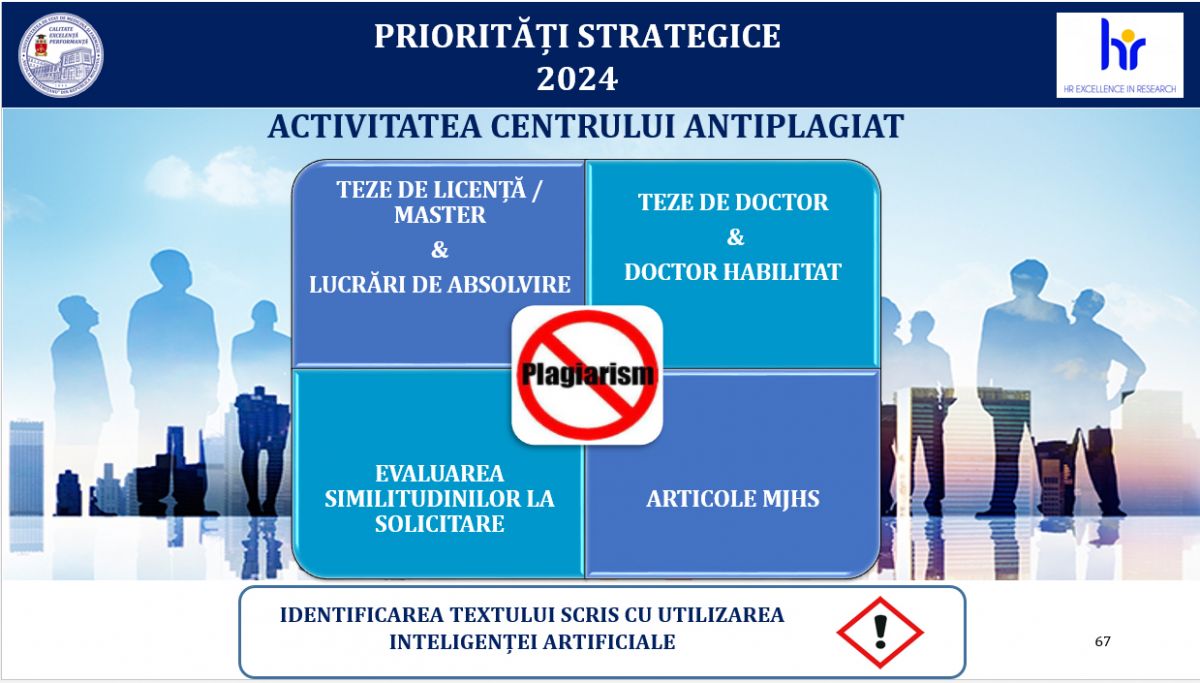
Within the Doctoral School in Health Sciences (DSHS), in 2024 the accreditation of the Molecular Technologies in Health master's program by the National Agency for Quality Assurance in Education and Research will take place. In this regard, under the FORCE_Med project, the expertise of the master's program is carried out by national and international experts.
In the context of the Anti-Plagiarism Policy, for the year 2024 the University has acquired a sufficient number of characters for the evaluation of all necessary scientific works. For the first time, the given system also allows the identification of written text with the application of artificial intelligence, which is being used more and more frequently.
The MJHS editorial office is working to include the publication on the DOAJ platform (Directory of Open Access Journals) in 2024 and is in the process of developing the journal's website. In the coming years, the editorial office of the MJHS will work to index the journal articles in the Web of Science and Scopus databases, in order to increase the international visibility of the journal.
The achievements in the field of research are due to the human scientific potential of Nicolae Testemitanu University represented by: 14 academicians, full members and corresponding members of the Academy of Sciences of Moldova, 1012 teaching and scientific-didactic staff members, 281 scientific researchers, of which 38% (106) aged up to 40 years, 152 Habilitated Doctors of Medical Sciences and 527 Doctors of Medical Sciences.
Preluarea informației de pe site-ul USMF „Nicolae Testemițanu” poate fi efectuată doar cu indicarea obligatorie a sursei și a linkului direct accesat pe www.usmf.md.

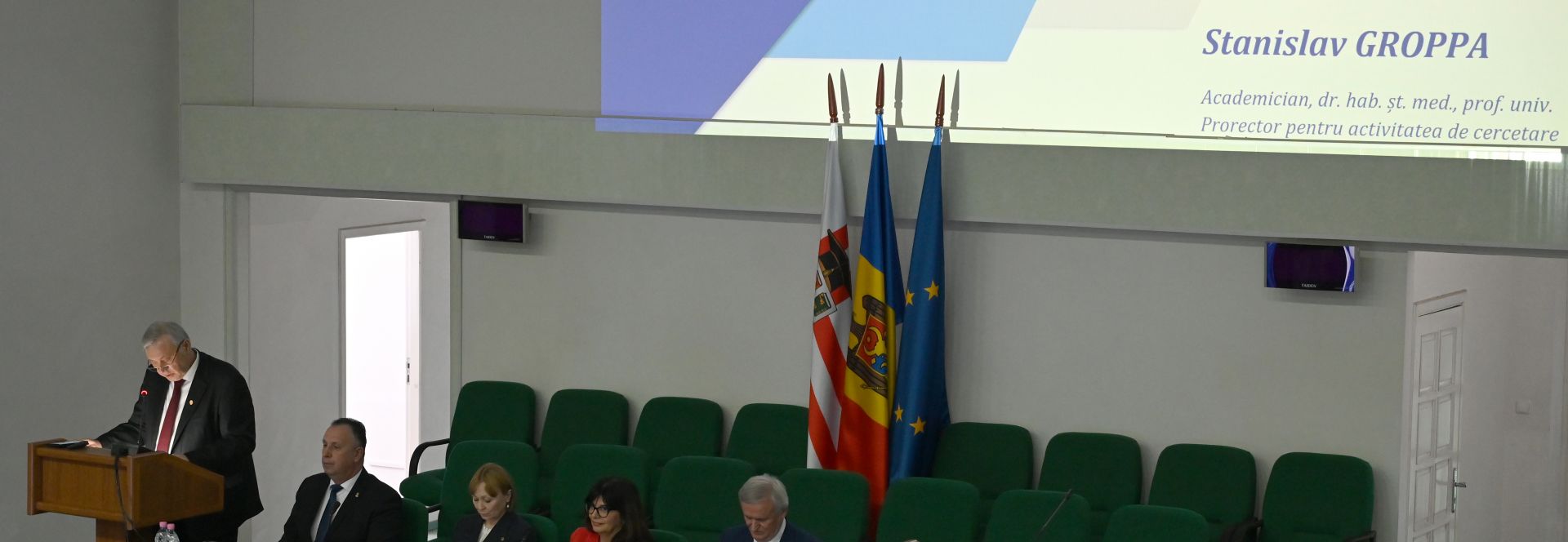
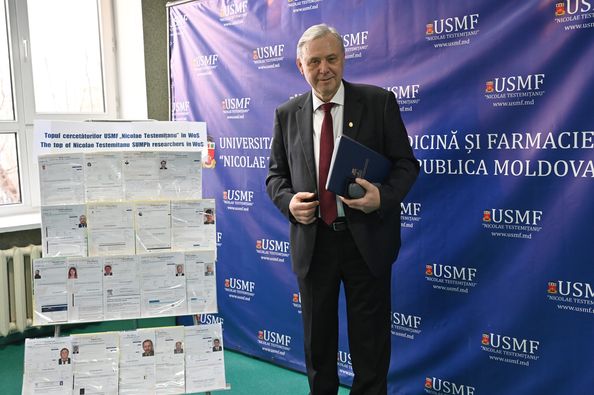
Comentarii